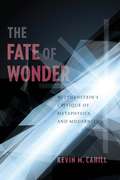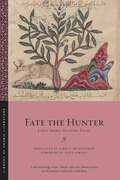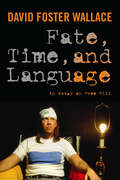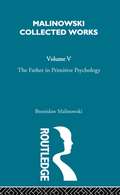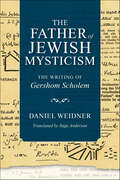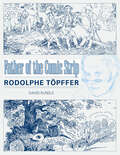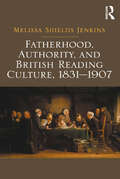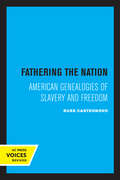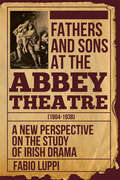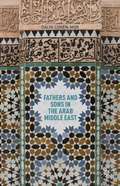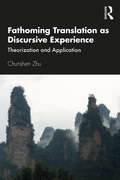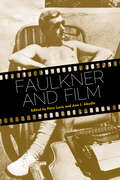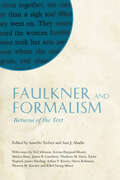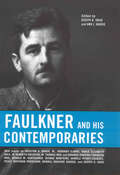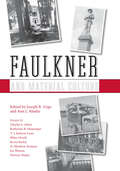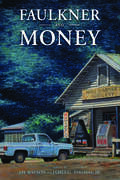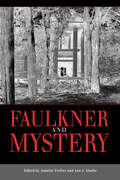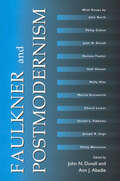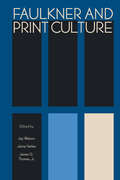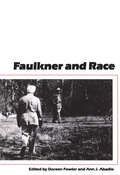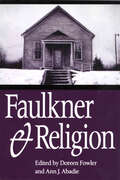- Table View
- List View
The Fate of Wonder: Wittgenstein's Critique of Metaphysics and Modernity
by Kevin CahillKevin M. Cahill reclaims one of Ludwig Wittgenstein's most passionately pursued endeavors: to reawaken a sense of wonder around human life and language and its mysterious place in the world. Following the philosopher's spiritual and cultural criticism and tying it more tightly to the overall evolution of his thought, Cahill frames an original interpretation of Wittgenstein's engagement with Western metaphysics and modernity, better contextualizing the force of his work.Cahill synthesizes several approaches to Wittgenstein's life and thought. He stresses the nontheoretical aspirations of the philosopher's early and later writings, combining key elements from the so-called resolute readings of the Tractatus with the "therapeutic" readings of Philosophical Investigations. Cahill shows how continuity in Wittgenstein's cultural and spiritual concerns informed if not guided his work between these texts, and in his reading of the Tractatus, Cahill identifies surprising affinities with Martin Heidegger's Being and Time—a text rarely associated with Wittgenstein's early formulations. In his effort to recapture wonder, Wittgenstein both avoided and undermined traditional philosophy's reliance on theory. As Cahill relates the steps of this bold endeavor, he forms his own innovative, analytical methods, joining historicist and contextualist approaches to text-based, immanent readings. The result is an original, sustained examination of Wittgenstein's thought.
Fate the Hunter: Early Arabic Hunting Poems (Library of Arabic Literature)
by James E. MontgomeryA rich anthology of pre-Islamic and early Islamic poetry on the beauties and perils of the huntIn the poems of Fate the Hunter, many of them translated into English for the first time, trained cheetahs chase oryx, and goshawks glare from falconers’ arms, while archers stalk their prey across the desert plains and mountain ravines of the Arabian peninsula. With this collection, James E. Montgomery, acclaimed translator of War Songs by ʿAntarah ibn Shaddād, offers a new edition and translation of twenty-six early works of hunting poetry, or ṭardiyyāt. Included here are poems by pre-Islamic poets such as Imruʾ al-Qays and al-Shanfarā, as well as poets from the Umayyad era such as al-Shamardal ibn Sharīk. The volume concludes with the earliest extant epistle about hunting, written by ʿAbd al-Ḥamīd al-Kātib, a master of Arabic prose.Through the eyes of the poet, the hunter’s pursuit of the quarry mirrors Fate’s pursuit of both humans and nonhumans and highlights the ambiguity of the encounter. With breathtaking descriptions of falcons, gazelles, and saluki gazehounds, the poems in Fate the Hunter capture the drama and tension of the hunt while offering meditations on Fate, mortality, and death.An English-only edition.
Fate, Time, and Language: An Essay on Free Will
by David WallaceIn 1962, the philosopher Richard Taylor used six commonly accepted presuppositions to imply that human beings have no control over the future. David Foster Wallace not only took issue with Taylor's method, which, according to him, scrambled the relations of logic, language, and the physical world, but also noted a semantic trick at the heart of Taylor's argument.Fate, Time, and Language presents Wallace's brilliant critique of Taylor's work. Written long before the publication of his fiction and essays, Wallace's thesis reveals his great skepticism of abstract thinking made to function as a negation of something more genuine and real. He was especially suspicious of certain paradigms of thought-the cerebral aestheticism of modernism, the clever gimmickry of postmodernism-that abandoned "the very old traditional human verities that have to do with spirituality and emotion and community." As Wallace rises to meet the challenge to free will presented by Taylor, we witness the developing perspective of this major novelist, along with his struggle to establish solid logical ground for his convictions. This volume, edited by Steven M. Cahn and Maureen Eckert, reproduces Taylor's original article and other works on fatalism cited by Wallace. James Ryerson's introduction connects Wallace's early philosophical work to the themes and explorations of his later fiction, and Jay Garfield supplies a critical biographical epilogue.
Fate, Time, and Language: An Essay on Free Will
by David Foster WallaceThe Pulitzer Prize finalist and author of The Pale King and Infinite Jest weighs in on a philosophical controversy in this fascinating early work. In 1962, the philosopher Richard Taylor used six commonly accepted presuppositions to imply that human beings have no control over the future. David Foster Wallace not only took issue with Taylor's method, which, according to him, scrambled the relations of logic, language, and the physical world, but also detected a semantic trick at the heart of Taylor's argument.Fate, Time, and Language presents Wallace's brilliant critique of Taylor's work. Written long before the publication of his fiction and essays, Wallace's thesis reveals his great skepticism of abstract thinking and any school of thought that abandons "the very old traditional human verities that have to do with spirituality and emotion and community." As Wallace rises to meet the challenge to free will presented by Taylor, we witness the developing perspective of this major novelist, along with his struggle to establish solid logical ground for his convictions. This volume, edited by Steven M. Cahn and Maureen Eckert, reproduces Taylor's original article and other works on fatalism cited by Wallace. James Ryerson's introduction connects Wallace's early philosophical work to the themes and explorations of his later fiction, and Jay Garfield supplies a critical biographical epilogue.
Fates of the Performative: From the Linguistic Turn to the New Materialism (Thinking Theory)
by Jeffrey T. NealonA powerful new examination of the performative that asks &“what&’s next?&” for this well-worn concept From its humble origins in J. L. Austin&’s speech-act theory of the 1950s, the performative has grown to permeate wildly diverse scholarly fields, ranging from deconstruction and feminism to legal theory and even theories about the structure of matter. Here Jeffrey T. Nealon discovers how the performative will remain vital in the twenty-first century, arguing that it was never merely concerned with linguistic meaning but rather constitutes an insight into the workings of immaterial force.Fates of the Performative takes a deep dive into this &“performative force&” to think about the continued power and relevance of this wide-ranging concept. Offering both a history of the performative&’s mutations and a diagnosis of its present state, Nealon traces how it has been deployed by key writers in the past sixty years, including foundational thinkers like Jacques Derrida, Eve Kosofsky Sedgewick, and Judith Butler; contemporary theorists such as Thomas Piketty and Antonio Negri; and the &“conceptual poetry&” of Kenneth Goldsmith.Ultimately, Nealon&’s inquiry is animated by one powerful question: what&’s living and what&’s dead in performative theory? In deconstructing the reaction against the performative in current humanist thought, Fates of the Performative opens up important conversations about systems theory, animal studies, object-oriented ontology, and the digital humanities. Nealon&’s stirring appeal makes a necessary declaration of the performative&’s continued power and relevance at a time of neoliberal ascendancy.
The Father in Primitive Psychology and Myth in Primitive Psychology: [1927]
by MalinowskiThis volume investigates ideas, beliefs and sentiments in relation to social organization.
The Father of Jewish Mysticism: The Writing of Gershom Scholem (New Jewish Philosophy and Thought)
by Daniel WeidnerThe Father of Jewish Mysticism offers an incisive look at the early life and writings of Gershom Scholem (1897–1982), the father of modern Jewish mysticism and a major 20th-century Jewish intellectual. Daniel Weidner offers the first full-length study, published in English, of Scholem's thought. Scholem, a historian ofthe Kabbalah and sharp critic of Jewish assimilation, played a major role in the study and popularization of Jewish mysticism.Through his work on the Kabbalah, Scholem turned the closed world of mystical texts into a force for Jewish identity. Skillfully drawing on Scholem's early diaries and writings, The Father of Jewish Mysticism introduces a young, soon-to-be legendary intellectual in search of himself and Judaism.
Father of the Comic Strip: Rodolphe Töpffer (Great Comics Artists Series)
by David KunzleSixty years before the comics entered the American newspaper press, Rodolphe Töpffer of Geneva (1799–1846), schoolmaster, university professor, polemical journalist, art critic, landscape draftsman, and writer of fiction, travel tales, and social criticism, invented a new art form: the comic strip, or “picture story,” that is now the graphic novel. At first he resisted publishing what he called his “little follies.” When he did, they became instantly popular, plagiarized, and imitated throughout Europe and the United States. Töpffer developed a graphic style suited to his poor eyesight: the doodle, which he systematized and also theorized. The drawings, with their “modernist” spontaneous, flickering, broken lines, forming figures in mad hyperactivity, run above deft, ironic captions and propel narratives of surreal absurdity. The artist's maniacal protagonists mix social satire with myth. By the mid-nineteenth century, Messrs. Jabot, Festus, Cryptogame, and other members of the crazy family, comprising eight picture stories in all, were instant folk heroes. In a biographical framework, Kunzle situates the comic strips in the Genevan and European culture of the time as well as in relation to Töpffer's other work, notably his hilarious travel tales, and recounts their curious genesis (with an initial imprimatur from Goethe, no less) and their controversial success. Kunzle's study, the first in English on the writer-artist, accompanies Rodolphe Töpffer: The Complete Comic Strips, a facsimile edition of the strips themselves, with the first-ever translation of these into English.
Fatherhood, Authority, and British Reading Culture, 1831-1907
by Melissa Shields JenkinsDuring a period when the idea of fatherhood was in flux and individual fathers sought to regain a cohesive collective identity, debates related to a father’s authority were negotiated and resolved through competing documents. Melissa Shields Jenkins analyzes the evolution of patriarchal authority in nineteenth-century culture, drawing from extra-literary and non-narrative source material as well as from novels. Arguing that Victorian novelists reinvent patriarchy by recourse to conduct books, biography, religious manuals, political speeches, and professional writing in the fields of history and science, Jenkins offers interdisciplinary case studies of Elizabeth Gaskell, George Meredith, William Makepeace Thackeray, George Eliot, Samuel Butler, and Thomas Hardy. Jenkins’s book contributes to our understanding of the part played by fathers in the Victorian cultural imagination, and sheds new light on the structures underlying the Victorian novel.
Fathering the Nation: American Genealogies of Slavery and Freedom
by Russ CastronovoRuss Castronovo underscores the inherent contradictions between America's founding principles of freedom and the reality of slavery in a book that probes mid-nineteenth-century representations of the founding fathers. He finds that rather than being coherent and consensual, narratives of nationhood are inconsistent, ambivalent, and ironic. He examines competing expressions of national memory in a wide range of mid-nineteenth-century artifacts: slave autobiography, classic American fiction, monumental architecture, myths of the Revolution, proslavery writing, and landscape painting. Castronovo theorizes a new American cultural studies which takes into consideration what Toni Morrison calls the "Africanist presence" that permeates American literature. He presents a genealogy that recovers those members of the national family whose status challenges the body politic and its history. The forgotten orphans in Melville's Moby-Dick and Israel Potter, the rebellious slaves in the work of Frederick Douglass and William Wells Brown, the citizens afflicted with amnesia in Lincoln's speeches, and the dispossessed sons in slave narratives all provide dissenting voices that provoke insurrectionary plots and counter-memories. Viewed here as a miscegenation of stories, the narrative of "America" resists being told of an intelligible story of uncontested descent. National identity rests not on rituals of consensus but on repressed legacies of parricide and rebellion. This title is part of UC Press's Voices Revived program, which commemorates University of California Press's mission to seek out and cultivate the brightest minds and give them voice, reach, and impact. Drawing on a backlist dating to 1893, Voices Revived makes high-quality, peer-reviewed scholarship accessible once again using print-on-demand technology. This title was originally published in 1995.
Fathers and Sons at the Abbey Theatre (1904-1938): A New Perspective on the Study of Irish Drama
by Fabio LuppiFathers and Sons at the Abbey Theatre demonstrates how the literary archetype of the clash between fathers and sons and the subsequent depiction of anti-oedipal figures become a major concern for the playwrights writing in a specific and crucial moment of Irish history (1904-1938). The father can be conceived both as a historical / political metaphor as well as a real father in a specific historical and social context. The classical models employed as theoretical tools to nuance the argument--Laius and Oedipus, Ulysses and Telemachus, Aeneas and Anchises, Priam and Hector, Hector and Astyanax--are challenged by the Christian example of Abraham and Isaac, subversively adjusted by Yeats to provide a tragic reading of post-colonial Ireland. All of these pairings provide archetypes for the understanding of complex personal and familial dynamics.°The book takes into consideration not only the most famous figures of the Irish National Theatre--as W.B. Yeats, J.M. Synge, Augusta Gregory, and Sean O'Casey--but also overlooked authors such as T.C. Murray, Padraic Colum, Paul Vincent Carroll, Lennox Robinson, Denis Johnston, George Shiels, St. John Ervine, Teresa Deevy. Many commentators have written about the playwrights of the Abbey Theatre, mainly focusing on politics, social classes, Irish identity, cultural issues, and linguistic aspects: no thorough analysis of the clash between generations has been published so far. Those who have tackled the issue have devoted their attention to a single author, or to a single aspect; this study aims to demonstrate that the repeated occurrence of anti-oedipal figures and of the archetype of the clash between fathers and sons?a clear manifestation of the need of emancipation from oppressive authorities and of change in Irish society?must be read as a common phenomenon and as a shared concern. The book is written for people interested in Irish studies, post-colonial studies, and theatre studies.
Fathers And Sons In The Arab Middle East
by Dalya Cohen-MorDrawing on insights from psychology, sociology, anthropology, religion, history, and literature, this book examines early and contemporary writings of male authors from across the Arab world to explore the traditional and evolving nature of father-son relationships in Arab families.
Fathers and Sons in Shakespeare
by Fred B. TromlySome of Shakespeare's most memorable male characters, such as Hamlet, Prince Hal, and Edgar, are defined by their relationships with their fathers. In Fathers and Sons in Shakespeare, Fred B. Tromly demonstrates that these relationships are far more complicated than most critics have assumed. While Shakespearean sons often act as their fathers' steadfast defenders, they simultaneously resist paternal encroachment on their autonomy, tempering vigorous loyalty with subtle hostility.Tromly's introductory chapters draw on both Freudian psychology and Elizabethan family history to frame the issue of filial ambivalence in Shakespeare. The following analytical chapters mine the father-son relationships in plays that span Shakespeare's entire career. The conclusion explores Shakespeare's relationship with his own father and its effect on his fictional depictions of life as a son. Through careful scrutiny of word and deed, the scholarship in Fathers and Sons in Shakespeare reveals the complex attitude Shakespeare's sons harbour towards their fathers.
Fathoming Translation as Discursive Experience: Theorization and Application
by Chunshen ZhuIn his positive approach to translation studies featured in this highly original volume, Chunshen Zhu brings into perspective from the vantage point of translation the workings of human factors in text production, interpretation, and dissemination in and through translation in varying social situations. This book examines a variety of key issues heatedly debated or largely neglected in the field of translation studies and beyond, for example, meaning making, nature of the Unit of Translation, augmentation of transitivity by modification, signification of repetition, and cognitive effects of syntactic iconicity, by critically engaging insights from functional linguistics and philosophy of language, among other fields of study. These issue-driven, phenomenon-focused, and theorization-oriented studies, presented in eight chapters with ample exemplification and case studies, form a coherent whole to bring a network of correlations between theory and practice, linguistics and literature, form and content, information structure and communicative function, intention and effect, and textuality and experience to bear upon the study of translation, fathoming its depths not only as a linguistic operation but more significantly as a textually accountable process of intersubjective and cross-lingual sign making that facilitates humans’ understanding of themselves and of the world. The book is therefore a useful reference for scholars, teachers, and postgraduate and research students who are interested in a comprehensive yet focused approach to translation as an academic subject straddling linguistics and literary, cultural, and social studies, as well as for those who would like to observe bilingualism and cross-cultural communication through translation in general and translation involving the Chinese language in particular.
Faulkner and Film (Faulkner and Yoknapatawpha Series)
by Peter Lurie Ann J. AbadieConsidering that he worked a stint as a screenwriter, it will come as little surprise that Faulkner has often been called the most cinematic of novelists. Faulkner's novels were produced in the same high period as the films of classic Hollywood, a reason itself for considering his work alongside this dominant form. Beyond their era, though, Faulkner's novels—or the ways in which they ask readers to see as well as feel his world—have much in common with film. That Faulkner was aware of film and that his novels’ own “thinking” betrays his profound sense of the medium and its effects broadens the contexts in which he can be considered. In a range of approaches, the contributors consider Faulkner’s career as a scenarist and collaborator in Hollywood, the ways his screenplay work and the adaptations of his fiction informed his literary writing, and how Faulkner’s craft anticipates, intersects with, or reflects upon changes in cultural history across the lifespan of cinema. Drawing on film history, critical theory, archival studies of Faulkner's screenplays and scholarship about his work in Hollywood, the nine essays show a keen awareness of literary modernism and its relation to film.
Faulkner and Formalism: Returns of the Text (Faulkner and Yoknapatawpha Series)
by Annette TrefzerFaulkner and Formalism: Returns of the Text collects eleven essays presented at the Thirty-fifth Annual Faulkner and Yoknapatawpha Conference sponsored by the University of Mississippi in Oxford on July 20-24, 2008. Contributors query the status of Faulkner's literary text in contemporary criticism and scholarship. How do scholars today approach Faulkner's texts? For some, including Arthur F. Kinney and James B. Carothers, “returns of the text” is a phrase that raises questions of aesthetics, poetics, and authority. For others, the phrase serves as an invitation to return to Faulkner's language, to writing and the letter itself. Serena Blount, Owen Robinson, James Harding, and Taylor Hagood interpret “returns of the text” in the sense in which Roland Barthes characterizes this shift his seminal essay “From Work to Text.”For Barthes, the text “is not to be thought of as an object . . . but as a methodological field,” a notion quite different from the New Critical understanding of the work as a unified construct with intrinsic aesthetic value. Faulkner's language itself is under close scrutiny in some of the readings that emphasize a deconstructive or a semiological approach to his writing. Historical and cultural contexts continue to play significant roles, however, in many of the essays. The contributions by Thadious Davis, Ted Atkinson, Martyn Bone, and Ethel Young-Minor by no means ignore the cultural contexts, but instead of approaching the literary text as a reflection, a representation of that context, whether historical, economic, political, or social, these readings stress the role of the text as a challenge to the power of external ideological systems. By retaining a bond with new historicist analysis and cultural studies, these essays are illustrative of a kind of analysis that carefully preserves attention to Faulkner's sociopolitical environment. The concluding essay by Theresa Towner issues an invitation to return to Faulkner's less well-known short stories for critical exposure and the pleasure of reading.
Faulkner and His Contemporaries (Faulkner and Yoknapatawpha Series)
by Joseph R. Urgo Ann J. AbadieAlthough he spent the bulk of his life in Oxford, Mississippi-far removed from the intellectual centers of modernism and the writers who created it—William Faulkner (1897–1962) proved to be one of the American novelists who most comprehensively grasped modernism. In his fiction he tested its tenets in the most startling and insightful ways. What, then, did such contemporaries as Ernest Hemingway, Eudora Welty, and Walker Evans think of his work? How did his times affect and accept what he wrote? Faulkner and His Contemporaries explores the relationship between the Nobel laureate, ensconced in his “postage stamp of native soil,” and the world of letters within which he created his masterpieces. In this anthology, essays focus on such topics as how Faulkner's literary antecedents (in particular, Willa Cather and Joseph Conrad) influenced his writing, his literary/aesthetic feud with rival Ernest Hemingway, and the common themes he shares with fellow southerners Welty and Evans. Several essays examine the environment in which Faulkner worked. Deborah Clarke concentrates on the rise of the automobile industry. W. Kenneth Holditch shows how the city of New Orleans acted as a major force in Faulkner's fiction, and Grace Elizabeth Hale examines how the civil rights era of Faulkner's later career compelled him to deal with his ideas about race and rebellion in new ways.
Faulkner and Material Culture: Faulkner And Yoknapatawpha 2004 (Faulkner and Yoknapatawpha Series)
by Joseph R. Urgo Ann J. AbadiePhotographs, lumber, airplanes, hand-hewn coffins—in every William Faulkner novel and short story worldly material abounds. The essays in Faulkner and Material Culture provide a fresh understanding of the things Faulkner brought from the world around him to the one he created. Charles S. Aiken surveys Faulkner's representation of terrain and concludes, contrary to established criticism, that to Faulkner, Yoknapatawpha was not a microcosm of the South but a very particular and quite specifically located place. Jay Watson works with literary theory, philosophy, the history of woodworking and furniture-making, and social and intellectual history to explore how Light in August is tied intimately to the region's logging and woodworking industries. Other essays in the volume include Kevin Railey's on the consumer goods that appear in Flags in the Dust. Miles Orvell discusses the Confederate Soldier monuments installed in small towns throughout the South and how such monuments enter Faulkner's work. Katherine Henninger analyzes Faulkner's fictional representation of photographs and the function of photography within his fiction, particularly in The Sound and the Fury, Light in August, and Absalom, Absalom!.
Faulkner and Money (Faulkner and Yoknapatawpha Series)
by Jay Watson and James G. ThomasContributions by Ted Atkinson, Gloria J. Burgess, David A. Davis, Sarah E. Gardner, Richard Godden, Ryan Heryford, Robert Jackson, Gavin Jones, Mary A. Knighton, Peter Lurie, John T. Matthews, Myka Tucker-Abramson, Michael Wainwright, Jay Watson, and Michael ZeitlinThe matter of money touches a writer's life at every point—in the need to make ends meet; in dealings with agents, editors, publishers, and bookstores; and in the choice of subject matter and the minutiae of imagined worlds. William Faulkner's Yoknapatawpha was no exception. The people and communities he wrote about stayed deeply entangled in personal, national, and even global networks of industry, commerce, and finance, as did the author himself. Faulkner's economic biography often followed, but occasionally bucked, the tumultuous economic trends of the twentieth century. The Faulkner met within these pages is among modern literature's most incisive and encyclopedic critics of what one contemporary theorist calls the madness of economic reason. Faulkner and Money brings together a distinguished group of scholars to explore the economic contexts of Faulkner's life and work, to follow the proverbial money toward new insights into the Nobel Laureate and new questions about his art. Essays in this collection address economies of debt and gift giving in Intruder in the Dust; the legacies of commodity fetishism in Sanctuary and of twentieth-century capitalism's financial turn in The Town; the pegging of self-esteem to financial acumen in the career of The Sound and the Fury's Jason Compson; the representational challenges posed by poverty and failure in Faulkner's Frenchman's Bend tales; the economics of regional readership and the Depression-era literary market; the aesthetic, monetary, and psychological rewards of writing for Hollywood; and the author's role as benefactor to an aspiring African American college student in the 1950s.
Faulkner and Mystery (Faulkner and Yoknapatawpha Series)
by Annette Trefzer & Ann J. AbadieContributions by Hosam Aboul-Ela, Susan V. Donaldson, Richard Godden, Michael Gorra, Lisa Hinrichsen, Donald M. Kartiganer, Sarah Mahurin, Sean McCann, Noel Polk, Esther Sánchez-Pardo, Annette Trefzer, Rachel Watson, and Philip Weinstein Faulkner and Mystery presents a wide spectrum of compelling arguments about the role and function of mystery in William Faulkner's fiction. Twelve new essays approach the question of what can be known and what remains a secret in the narratives of the Nobel laureate. Scholars debate whether or not Faulkner's work attempts to solve mysteries or celebrate the enigmas of life and the elusiveness of truth. Scholars scrutinize Faulkner's use of the contemporary crime and detection genre as well as novels that deepen a plot rather than solve it. Several essays are dedicated to exploring the narrative strategies and ideological functions of Faulkner's take on the detective story, the classic “whodunit.” Among Faulkner's novels most interested in the format of detection is Intruder in the Dust, which assumes a central role in this essay collection. Other contributors explore the thickening mysteries of racial and sexual identity, particularly the enigmatic nature of his female and African American characters. Questions of insight, cognition, and judgment in Faulkner's work are also at the center of essays that explore his storytelling techniques, plot development, and the inscrutability of language itself.
Faulkner and Postmodernism (Faulkner and Yoknapatawpha Series)
by John N. Duvall Ann J. AbadieSince the 1960s, William Faulkner, Mississippi's most famous author, has been recognized as a central figure of international modernism. But might Faulkner's fiction be understood in relation to Thomas Pynchon's Gravity's Rainbow as well as James Joyce's Ulysses? In eleven essays from the 1999 Faulkner and Yoknapatawpha Conference, held at the University of Mississippi, Faulkner and Postmodernism examines William Faulkner and his fiction in light of postmodern literature, culture, and theory. The volume explores the variety of ways Faulkner's art can be used to measure similarities and differences between modernism and postmodernism. Essays in the collection fall into three categories: those that use Faulkner's novels as a way to mark a period distinction between modernism and postmodernism, those that see postmodern tendencies in Faulkner's fiction, and those that read Faulkner through the lens of postmodern theory's contemporary legacy, the field of cultural studies. In order to make their particular arguments, essays in the collection compare Faulkner to more contemporary novelists such as Ralph Ellison, Vladimir Nabokov, Thomas Pynchon, Walker Percy, Richard Ford, Toni Morrison, and Kathy Acker. But not all of the comparisons are to high-culture artists, since even Elvis Presley becomes Faulkner's foil in one of the essays. A variety of theoretical perspectives frame the work in this volume, from Fredric Jameson's pessimistic sense of postmodernism's possibilities to Linda Hutcheon's conviction that cultural critique can continue in postmodernism through innovative new forms such as metafiction. Despite the different theoretical premises and distinct conclusions of the individual authors of these essays, Faulkner and Postmodernism proves once again that in the key debates surrounding twentieth-century fiction, Faulkner is a crucial figure.
Faulkner and Print Culture (Faulkner and Yoknapatawpha Series)
by Jay Watson, Jaime Harker and James G. ThomasWith contributions by Greg Barnhisel, John N. Duvall, Kristin Fujie, Sarah E. Gardner, Jaime Harker, Kristi Rowan Humphreys, Robert Jackson, Mary A. Knighton, Jennifer Nolan, Carl Rollyson, Tim A. Ryan, Jay Satterfield, Erin A. Smith, Jay Watson, and Yung-Hsing WuWilliam Faulkner's first ventures into print culture began far from the world of highbrow New York publishing houses such as Boni & Liveright or Random House and little magazines such as the Double Dealer. With that diverse publishing history in mind, this collection explores Faulkner's multifaceted engagements, as writer and reader, with the US and international print cultures of his era, along with how these cultures have mediated his relationship with various twentieth- and twenty-first-century audiences.These essays address the place of Faulkner and his writings in the creation, design, publishing, marketing, reception, and collecting of books; in the culture of twentieth-century magazines, journals, newspapers, and other periodicals (from pulp to avant-garde); in the history of modern readers and readerships; and in the construction and cultural politics of literary authorship.Several contributors focus on Faulkner's sensational 1931 novel Sanctuary to illustrate the author's multifaceted relationship to the print ecology of his time, tracing the novel's path from the wellsprings of Faulkner's artistic vision to the novel's reception among reviewers, tastemakers, intellectuals, and other readers of the early 1930s. Other essayists discuss Faulkner's early notices, the Saturday Review of Literature, Saturday Evening Post, men's magazines of the 1950s, and Cold War modernism.
Faulkner and Race (Faulkner and Yoknapatawpha Series)
by Doreen FowlerWith contributions by Eric J. Sundquist, Craig Werner, Blyden Jackson, Thadious Davis, Pamela J. Rhodes, Walter Taylor, Noel Polk, James A. Snead, Philip M. Weinstein, Lothar Hönnighausen, Frederick R. Karl, Hoke Perkins, Sergei Chakovsky, Michael Grimwood, and Karl F. ZenderThe essays in this volume address William Faulkner and the issue of race. Faulkner resolutely has probed the deeply repressed psychological dimensions of race, asking in novel after novel the perplexing question: what does blackness signify in a predominantly white society? However, Faulkner's public statements on the subject of race have sometimes seemed less than fully enlightened, and some of his black characters, especially in the early fiction, seem to conform to white stereotypical notions of what black men and women are like. These essays, originally presented by Faulkner scholars, black and white, male and female, at the 1986 Faulkner and Yoknapatawpha Conference, the thirteenth in a series of conferences held on the Oxford campus of the University of Mississippi, explore the relationship between Faulkner and race.
Faulkner and Religion (Faulkner and Yoknapatawpha Series)
by Doreen FowlerThese ten essays from the annual Faulkner and Yoknapatawpha Conference, held in 1989 at the University of Mississippi, explore the religious themes in William Faulkner's fiction. The papers published here conclude that the key to religious meaning in Faulkner may be that his texts focus not so much on God but on a human aspiration of the divine.
